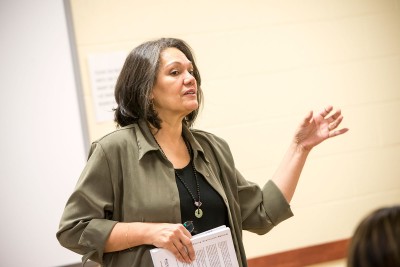 Fresh from a sabbatical to Thailand, Neag Professor Xae Alicia Reyes has always found her life to be international.
Fresh from a sabbatical to Thailand, Neag Professor Xae Alicia Reyes has always found her life to be international.
“My interest in strengthening our sense of being part of the international community is a strong part of my identity as a military dependent,” says Reyes. “My mother was also a military dependent born in the Panama Canal Zone, so schooling throughout the world has always interested me and fostered a passion for learning something from everyone.”
Reyes began her international higher education in Puerto Rico where she received both a B.A. in Economics and M.A. in translation from the University of Puerto Rico. Before earning a Ph.D. in social, multicultural, bilingual foundations of education from the University of Colorado – Boulder, Reyes returned to the University of Puerto Rico as a teacher.
“Education was emphasized in my family since I can remember,” says Reyes. “Teaching teachers became a passion of mine while directing Student Support Services (a TRIO program) at the University of Puerto Rico in the late 80s.” The TRIO program that Reyes mentions is a part of a set of federal programs that reach out to individuals that are first generation college students from disadvantaged backgrounds. Programs are designed to help participants navigate the college experience and succeed in their academic pursuits.
In the fall of 1999, Reyes arrived at UConn and developed a course for Neag that drew from her experiences in the TRIO programs, research on migration issues, and the socio-cultural and historical frameworks of Latino education in the US. The course integrated Reyes’ work with the Institute of Puerto Rican and Latino Studies (IPRLS) with her work at Neag and the cross-listed course became “Latinos and US Education.”
Along with teaching, Reyes became the Interim Director of the Puerto Rican and Latino American Cultural Center (PRLACC) for a little over a year. Reyes represented and advocated for PRLACC interests throughout UConn, reporting directly to the vice president of diversity and equity. Reyes also coordinated a mentoring program called “METAS” that involved the teaching of the Latino Leadership and Mentoring course, which she revised during her tenure there by adding a field internship for coordinators to the program. “I reconfigured the academic mission and linkages to the IPRLS and emphasized academic and career opportunities at the University and beyond,” says Reyes.
Reyes’ international style on education has always been a reflection of her past experiences learning languages and interacting with people with different backgrounds from a variety of countries and throughout the Unites States.
“I love conveying the power of these experiences to my students and exploring how our backgrounds intersect,” says Reyes. “I also encourage learning other languages and experiencing other cultures by taking my students to events in Windham and Hartford that give them opportunities to interact with families outside of the school setting.”
Past and current students have a deep appreciation for the ideals that Reyes’ classes have taught them and for Reyes as a teacher, says Mary Anne Doyle, Department Chair of Curriculum and Instruction at the Neag School of Education. According to Doyle, Reyes is very passionate about teaching and committed to her students by having them broaden their experience. Each graduate course is taught the same ideas but the courses are shaped depending on the students within it.
“Everything Reyes experiences, she shares with her students through teaching,” says Doyle “Her students value her expertise, breadth of knowledge and interest in their studies.”
Recently, Reyes returned from her second trip to Burapha University in Thailand where Reyes expanded on her previous Fulbright project from 2009. The Fulbright project mentored new faculty members in Burapha University on the “best practices for college teaching with diverse populations, and development of individual and collaborative research and scholarship,” says Reyes. Reyes also assisted the International College by providing training for math and science high school teachers that teach their content in English (which are a part of a Regional Association of South East Asian Nations-ASEAN economic exchange initiative).
“My four month stay reaffirmed my belief in experiencing languages and cultures on site to broaden our perspectives and relate more effectively to people who may not share our backgrounds,” says Reyes. “I continue to encourage these dispositions among my Neag and UConn students so that we can truly become citizens of the world and more effective practitioners.”
Due to Reyes’ involvement with Burapha University, university officials from Thailand are exploring partnerships with UConn in areas with some compatibility with their programs. Marine Sciences at the Avery Point campus and science research labs are areas of interest due to similarity in the programs between the two Universities. Burapha officials will be visiting UCONN in late March.
For Reyes, seeing her students broaden their experiences, views of the world and the people in it, is a job well done. Reyes wants to see her students come out of her classes with these new ideals and to succeed in infusing them throughout their lives.
“Nothing is more gratifying than to see former students become excellent teachers and professionals who are open to continued learning by broadening their world views, and learning from their own students, and from each other,” says Reyes.
 Facebook
Facebook
 Twitter
Twitter
 LinkedIn
LinkedIn
